- Joined
- Oct 9, 2007
- Messages
- 47,449 (7.50/day)
- Location
- Hyderabad, India
| System Name | RBMK-1000 |
|---|---|
| Processor | AMD Ryzen 7 5700G |
| Motherboard | ASUS ROG Strix B450-E Gaming |
| Cooling | DeepCool Gammax L240 V2 |
| Memory | 2x 8GB G.Skill Sniper X |
| Video Card(s) | Palit GeForce RTX 2080 SUPER GameRock |
| Storage | Western Digital Black NVMe 512GB |
| Display(s) | BenQ 1440p 60 Hz 27-inch |
| Case | Corsair Carbide 100R |
| Audio Device(s) | ASUS SupremeFX S1220A |
| Power Supply | Cooler Master MWE Gold 650W |
| Mouse | ASUS ROG Strix Impact |
| Keyboard | Gamdias Hermes E2 |
| Software | Windows 11 Pro |
AMD followed up its Ryzen processor launch with support for the software development ecosystem by releasing special C and C++ compilers that let you make software that can fully take advantage of the "Zen" micro-architecture. The new AOCC 1.0 C/C++ compilers by AMD are based on LLVM Clang, with "Zen" specific patches. AMD claims AOCC offers improved vectorization and better code generation for "Zen" based CPUs. It also includes a "Zen" optimized linker.
Phoronix benchmarked AOCC against other more common compilers such as GCC 6.3, GCC 7.1, GCC 8, LLVM Clang 4.0, and LLVM Clang 5.0 using a Ryzen 7-1700 eight-core processor powered machine, running on Ubuntu 17.04 Linux, and found that AOCC offers higher performance than GCC in most cases, LLVM Clang in some cases, and marginally higher performance than LLVM Clang in some cases. Find more results in the link below.
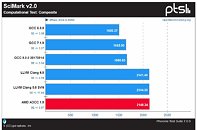
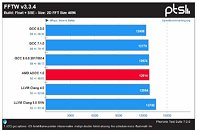
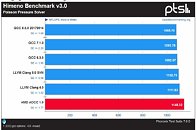
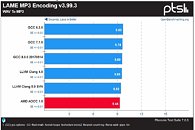
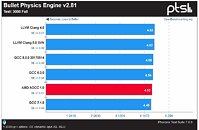
View at TechPowerUp Main Site
Phoronix benchmarked AOCC against other more common compilers such as GCC 6.3, GCC 7.1, GCC 8, LLVM Clang 4.0, and LLVM Clang 5.0 using a Ryzen 7-1700 eight-core processor powered machine, running on Ubuntu 17.04 Linux, and found that AOCC offers higher performance than GCC in most cases, LLVM Clang in some cases, and marginally higher performance than LLVM Clang in some cases. Find more results in the link below.





View at TechPowerUp Main Site




